
Hamburg, officially the Free and Hanseatic City of Hamburg, is the second-largest city in Germany after Berlin, as well as the overall 7th largest city and largest non-capital city in the European Union with a population of over 1.84 million. Hamburg's urban area has a population of around 2.5 million and its metropolitan area is home to more than five million people. The city lies on the River Elbe and two of its tributaries, the River Alster and the River Bille. One of Germany's 16 federated states, Hamburg is surrounded by Schleswig-Holstein to the north and Lower Saxony to the south.
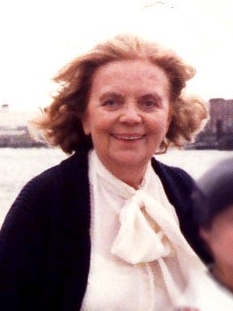
Heidi Bertha Auguste Kabel was a German actress and musician. Most of her stage roles were performed at the Ohnsorg-Theater in Hamburg, many of them in Low German. She became famous in Germany as many of the productions of the Ohnsorg Theater were transmitted on German television.
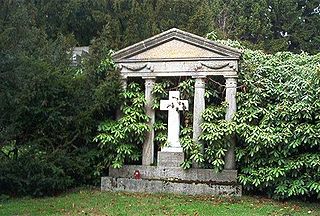
Ohlsdorf Cemetery in the Ohlsdorf quarter of the city of Hamburg, Germany, is the biggest rural cemetery in the world and the fourth-largest cemetery in the world. Most of the people buried at the cemetery are civilians, but there is also a large number of victims of war from various nations. The cemetery notably includes the Old Hamburg Memorial Cemetery with the graves of many notable Hamburg citizens.

He lücht is an expression used in Hamburg, Germany, for tour guides in port of Hamburg.
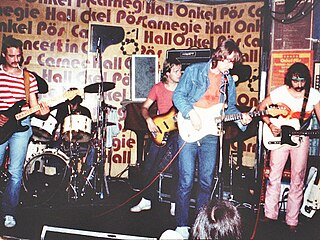
Onkel Pös Carnegie Hall, better known as Onkel Pö, was a music venue in Hamburg in the 1970s and the early 1980s.
Paul Pörtner was a German playwright, novelist, translator, and editor.

Theater für Kinder or Allee-Theater is a theatre in Hamburg, Germany. Located in the Max-Brauer-Allee 76 in Hamburg-Altona, it was founded in 1968 as a privately run children's theater by Uwe Deeken. Since 1996 the Hamburg Chamber Opera has performed there under the same management,

Harburger Theater is a theatre in Hamburg, Germany. It showcases classic plays, comedies, modern pieces and musicals. The theater hall is located in the main building of the Hamburg Archaeological Museum and the Museumplatz in Harsburg. The head of the theater is Axel Schneider, who also heads the Altona Theater and the Hamburger Kammerspiele. He has been with the Harburger Theater since 2003.
The Biermann-Ratjen-Medaille is an award of the City of Hamburg, Germany. It was founded in 1978 by the Senate of the Free and Hanseatic City of Hamburg to commemorate the achievements of the previous senator of culture Hans-Harder Biermann-Ratjen. The award is given to people, groups and institutions who have made outstanding contributions to the culture of Hamburg. The Praeses of the Department of Culture decides on the recipients and awards the medal on behalf of the Senate.

Hamburg-Harburg Rathaus station is a station of the Hamburg S-Bahn on the Harburg S-Bahn in the suburb Harburg in the German city of Hamburg and is capable of serving as a bunker.

The NDR Chor is the choir of the German broadcaster Norddeutscher Rundfunk (NDR), based in Hamburg. It was founded in 1946, with Max Thurn as the first director of then 55 singers. The group has participated in premieres of contemporary music, such as the posthumous concert premiere of Schoenberg's opera Moses und Aron. It is also known for a capella music, introduced by Helmut Franz such as a recording of all such works by Johannes Brahms. The current artistic director is Philipp Ahmann, who has held the position from 2008. NDR Chor, now a group of 28 singers, is one of the leading professional chamber choirs in Germany.

Große Bleichen are an upmarket shopping street in the Neustadt quarter of Hamburg, Germany.

Natias Neutert is a German artist, author, poet, orator, and translator who lives in Hamburg and Berlin.
Bakery Jatta is a Gambian professional footballer who plays as a midfielder for 2. Bundesliga club Hamburger SV.

Linda Zervakis is a German-Greek television presenter as well as newsreader and journalist. She was the first Tagesschau presenter with an immigrant background.
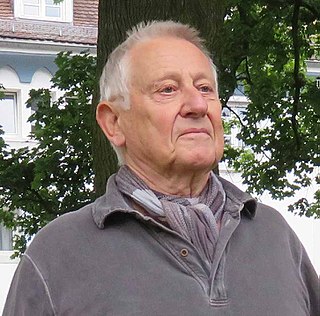
Hansgünther Heyme is a German theatre director and prominent figure in the Regietheater movement of the 1960s and 70s. Born in Bad Mergentheim, he studied at Heidelberg University and then under the German director Erwin Piscator. Heyme was the artistic director of the Staatstheater Wiesbaden from 1964 to 1967, the Schauspiel Köln from 1968 to 1979, the Württemberg State Theatre in Stuttgart from 1979 to 1986, the Ruhrfestspiele theatre festival from 1990 to 2003, and the Theater im Pfalzbau in Ludwigshafen from 2004 to 2014. Now in his 80s, he continues to work as a freelance director.
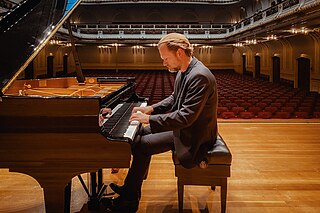
Sebastian Knauer is a German classical pianist.
Folker Bohnet was a German actor, theatre director and playwright. He played in the 1959 film Die Brücke directed by Bernhard Wicki while still a student in Berlin. Later, he focused on comedy for the stage, as actor, director and author of plays, touring internationally. He was a regular director and actor at the Ohnsorg-Theater in Hamburg.
Felix Jud (1899–1985) was a political activist and German bookseller. He was born in Wilhelmstal and was educated as an ironmonger.

Sören Sieg is a German tenor, songwriter, composer, arranger, satirist, columnist and writer. He is a co-founder of the a cappella group LaLeLu, in which he sang as a tenor and hosted the performances from 1994 to 2012. From 2009 to 2013, he regularly wrote a front page column for the Bremer Newspaper. In the meantime, he works mainly as a freelance writer and composer.















